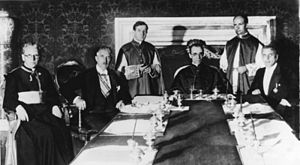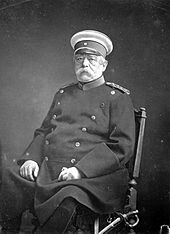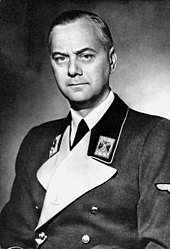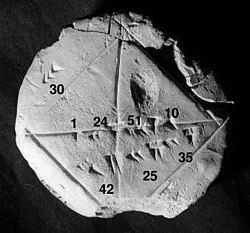From Wikipedia, the free encyclopedia
The Catholic Church
has been subject to criticism throughout its history for its beliefs
and practices. Criticisms of the Catholic Church's religious beliefs
and practices have often led to breaks with other Christian groups, such
as the
schism with the Eastern Orthodox Church and the
Protestant Reformation.
The Catholic Church has also been criticized for its active efforts to
influence political decisions, such as the Church's promotion of the
Crusades
and its involvement with various 20th century nationalist regimes.
More recent criticism focuses on alleged scandals within the Church,
particularly alleged financial corruption and the
Catholic Church's sexual abuse scandals.
Internal
Use of Latin
Before the reforms from
Vatican II in the late 1960s the Catholic Church was best-known outside the church for the
Tridentine Mass, said mostly in
Latin with a few sentences in
Ancient Greek and
Hebrew.
Since 1970, the Mass has been celebrated in the local language of where
it is celebrated, and the Mass in Latin less frequently. A minority of
Roman Catholics however prefer the Mass to be celebrated in Latin,
generally arguing that the Latin text is more authentic, and truer to
scripture and doctrine than the
Mass of Paul VI. However, in 2007, Pope
Benedict XVI
loosened some restrictions on its use with the aim of healing the rift
that had come about between advocates of the Novus Ordo Mass and those
of the Tridentine Mass.
The 2007
motu proprio Summorum Pontificum, allowing a wider use of the
Tridentine Mass raised concerns in the Jewish community regarding the Good Friday liturgy which contained a prayer "
For the conversion of the Jews" referring to Jewish "blindness" and prays for them to be "delivered from their darkness." The
American Jewish Committee
pointed out that this raises "negative implications that some in the
Jewish community and beyond have drawn concerning the motu proprio." In response to such complaints, Pope Benedict XVI in 2008 replaced the prayer in the 1962 Missal with
a newly composed prayer that makes no mention of blindness or darkness.
Traditionalist Catholics
Clerical celibacy
In the Catholic Church priestly celibacy is seen as a
charism bestowed by the Holy Spirit, enabling one to make a total commitment of oneself in service of the kingdom of God. The scriptural basis for this is found in Matthew 19:12 and 1 Corinthians 7:32-35.
Married men can be ordained to the permanent diaconate, but only
unmarried men may be ordained priests. As celibacy is a discipline
rather than doctrine, it can be abrogated in particular situations, as
when, for example, married Anglican priests are ordained to the Catholic
priesthood to minister in
personal ordinariates. (Members of the Anglican hierarchy found the creation of the personal ordinariate "insensitive".)
Some Eastern Rite Catholic Churches such as the Ukrainian Greek
Catholic Church allow the ordination of married men as priests. Only
unmarried men may be ordained to the episcopate. Priestly celibacy
continues to be the subject of a good deal of discussion. Proponents who
view this as something that should be revisited say that it precludes
otherwise qualified candidates from the priesthood, noting a shortage of
priests in some areas.
The
Wisconsin Evangelical Lutheran Synod has strongly criticized clerical celibacy as a violation of Biblical teaching. Martin Luther wrote the following regarding priestly celibacy in "
On Monastic Vows":
If you obey the gospel, you ought
to regard celibacy as a matter of free choice. ... They [Jesus and Paul]
glory in faith alone. They praise celibacy not because the chaste are
more perfect than others because they are chaste, and not because they
do not lust contrary to the command, but because they are free from the
cares and tribulation of the flesh which Paul attributes to marriage [1
Corinthians 7:32], and may freely and without hindrance dedicate
themselves day and night to the word and faith.
Ordination of women
The teaching of the Catholic Church on ordination, as expressed in the
Code of Canon Law, the
Catechism of the Catholic Church, and the
apostolic letter Ordinatio sacerdotalis, is that "only a baptized man validly receives sacred ordination".
According to Roman Catholic thinking, the priest is acting 'in persona
Christi' (that is, in the Person of Christ). In 1979, Sister Theresa
Kane, then president of the
Leadership Conference of Women Religious challenged Pope John Paul II from the podium at the
National Shrine of the Immaculate Conception in Washington, DC, to include women “in all ministries of our Church”.
In his Apostolic Letter
Ordinatio sacerdotalis (1994),
Pope John Paul II said the "Priestly ordination, ... has in the Catholic Church from the beginning always been reserved to men alone." He cited the Congregation for the Doctrine of the Faith (under
Pope Paul VI)
Declaration Inter Insigniores on the question of the Admission of Women to the Ministerial Priesthood,
and declared that “the Church has no authority whatsoever to confer
priestly ordination on women and that this judgment is to be
definitively held by all the Church's faithful.”
The reasons given included: "the example recorded in the Sacred
Scriptures of Christ choosing his Apostles only from among men; the
constant practice of the Church, which has imitated Christ in choosing
only men; and her living teaching authority which has consistently held
that the exclusion of women from the priesthood is in accordance with
God's plan for his Church."
Some groups, nonetheless, say the matter should still be open for discussion. Dissenters do not regard
Ordinatio sacerdotalis as definitive Church teaching. But in June 2018
Pope Francis
said, "We cannot do this with Holy Orders (women priests) because
dogmatically we cannot. Pope John Paul II was clear and closed the door
and I'm not going to go back on that. It [John Paul's decision] was
serious, it was not a capricious thing."
But from the start of his papacy Francis has pointed out that "if
sacramental power is too closely identified with power in general. It
must be remembered that when we speak of sacramental power “we are in
the realm of function, not that of dignity or holiness'” (EG 104).
Since Vatican II, women have taken an increased role in the Church. In 1994, the Vatican
Congregation for Divine Worship and the Discipline of the Sacraments formally interpreted the 1983 Code of Canon Law, stating that women could assist at Mass as acolytes or
altar servers. Women also serve as lectors and
extraordinary ministers.
Still many people see the Church's position on the ordination of women
as a sign that women are not equal to men in the Catholic Church, though
the Church rejects this inference.
In a separate but related issue, Pope Francis set up the Pontifical
Commission for the Study of the Diaconate of Women to study women
deacons in the early church, to help answer the question of whether
women could also serve as deacons today. The Commission submitted its
inconclusive report to Pope Francis in January 2019.
Interfaith
Judaism
In the
Middle Ages, religion played a major role in driving
antisemitism.
Adversus Judaeos ("against the Judeans") are a series of fourth century homilies by
John Chrysostom directed to members of the
church of Antioch of his time, who continued to observe Jewish feasts and fasts. Critical of this, he cast Judaism and the
synagogues
in his city in a critical and negative light. The use of hyperbole and
other rhetorical devices painted a harsh and negative picture of the
Jews. This was largely ignored until the Jewish anti-Christian teachings
began to surface in Muslim Andalusia in the 11th and 12th centuries. According to historian
William I. Brustein, his sermons against Jews gave further momentum to the idea that Jews are collectively
responsible for the death of Jesus.
"Over the course of time, Christians began to accept ... that the
Jewish people as a whole were responsible for killing Jesus. According
to this interpretation, both the
Jews present at Jesus’ death and the Jewish people collectively and for all time, have committed the sin of
deicide,
or God-killing. For 1900 years of Christian-Jewish history, the charge
of deicide has led to hatred, violence against and murder of Jews in
Europe and America."
In 1998,
Pope John Paul II
apologized for the failure of Catholics to help Jews during the
Holocaust and acknowledged that Christian anti-semitism might have made
Nazi persecution of the Jews easier, calling them "our elder brothers"
in the faith.
Russian Orthodoxy
In
2007, then Orthodox Patriarch Alexei II of Moscow objected to what he
termed "proselytizing" by clerics of the Eastern Rite of the Catholic
Church. Catholic officials replied that their efforts in Russia were not
aimed at Orthodox believers, but were reaching out to the vast majority
of Russians who are not churchgoers. The Congregation for the Doctrine
of the Faith rejected the characterization of "proselytizing" and said
that respect towards non Catholic Christians must not negate the
possibility of conversion, if an individual should so chose.
Protestantism
Common factors that played a role during the
Reformation and the
Counter-Reformation included the rise of nationalism, simony, the appointment of Cardinal-nephews, the sale of
indulgences,
and other corruption in the Roman Curia and other ecclesiastical
hierarchy, as well as the impact of humanism, the new learning of the
Renaissance, the epistemological shift between the
schola moderna and
schola antiqua within scholasticism, and the Western Schism that eroded loyalty to the Papacy.
Protestants hold doctrinal differences with the Catholic Church
in a number of areas, including the understanding of the meaning of the
word "faith" and how it relates to "good works" in terms of salvation,
and a difference of opinion regarding the concept of "justification",
and the Catholic Church's belief in
Sacred Tradition as a source of revelation complementary to Sacred Scripture. Some scholars of Early Christianity are adherents of the
New Perspective on Paul
and so believe "sola fide" is a misinterpretation on the part of
Lutherans and that Paul was actually speaking about laws (such as
Circumcision, Dietary laws, Sabbath, Temple rituals, etc.) that were
considered essential for the Jews of the time.
Islam
Buddhism
In 1994,
Pope John Paul II wrote
Crossing the Threshold of Hope, in which he discussed various non-Christian religions, including
Buddhism.
The book prompted widespread criticism from the Buddhist community, and
the pope's statements were characterized as misunderstanding and
offending Buddhism.
Thinley Norbu Rinpoche, a
Tibetan Buddhist lama,
wrote a book to address the "serious, gratuitous misrepresentations of
Buddhist doctrine which seemed to be based on misunderstandings"
contained within
Crossing the Threshold of Hope.
Bhikkhu Bodhi, a
Theravada Buddhism scholar, published an essay "intended as a short corrective to the Pope's demeaning characterization of Buddhism" entitled
Toward a Threshold of Understanding.
Historical
Simony
Simony
is usually defined "a deliberate intention of buying or selling for a
temporal price such things as are spiritual or annexed unto spirituals". Although an offense against
canon law, simony became widespread in the
Catholic Church in the 9th and 10th centuries.
Response to heresy
The development of doctrine, the position of orthodoxy, and the
relationship between the early Church and early heretical groups is a
matter of academic debate. Before the 12th century, Christianity
gradually suppressed what it saw as
heresy usually through a system of ecclesiastical sanctions,
excommunication, and
anathema.
Later, an accusation of heresy could be construed as treason against
lawful civil rule, and therefore punishable by civil sanctions such as
confiscation of property, imprisonment, or death, though the latter was
not frequently imposed, as this form of punishment had many
ecclesiastical opponents.
Within five years of the official 'criminalization' of heresy by the
emperor, the first Christian heretic, Priscillian, was executed in 385
by Roman officials. For some years after the Protestant Reformation,
Protestant denominations were also known to execute those whom they
considered heretics.
When John Paul II visited Prague in the 1990s, he apologized for the execution of
Jan Hus
on charges of heresy and requested experts in this matter "to define
with greater clarity the position held by Jan Hus among the Church's
reformers", and acknowledged that "independently of the theological
convictions he defended, Hus cannot be denied integrity in his personal
life and commitment to the nation's moral education."
In 2015, after visiting a
Waldensian Temple in
Turin,
Pope Francis,
in the name of the Catholic Church, asked Waldensian Christians for
forgiveness for their persecution. The Pope apologized for the Church's
"un-Christian and even inhumane positions and actions".
Crusades
Elements of the Crusades were criticized by some from the time of their inception in 1095.
Roger Bacon
felt the Crusades were counter-productive because, "those who survive,
together with their children, are more and more embittered against the
Christian faith."
In spite of some criticism, the movement was still widely supported in
Europe long after the fall of Acre in 1291. After that, the Crusades to
recover
Jerusalem and the Christian East were unsuccessful.
Eighteenth century rationalists judged the Crusaders harshly. In the 1950s, Sir
Steven Runciman published a highly critical account of the Crusades which referred to Holy War as "a sin against the Holy Ghost".
Magdalene laundries
Magdalene laundries, also known as Magdalene's asylums, were
Protestant but later in Ireland largely Roman Catholic institutions that
operated from the 18th to the late 20th centuries, to house "
fallen women". The term implied
female sexual promiscuity or work in
prostitution;
young women who became pregnant outside of marriage, or whose male
family members complained about their behavior, were committed here.
They were required to work as part of their board, and the institutions
operated large commercial laundries, serving customers outside their
church bases. Many of these "laundries" were effectively operated as
penitentiary work-houses. Laundries such as this operated throughout
Europe and North America for much of the nineteenth and well into the
twentieth century, the last one closing in 1996. The institutions were named after the Biblical figure
Mary Magdalene, in earlier centuries characterised as a reformed prostitute.
Nationalist critique
As early as the second century,
Justin Martyr addressed his
First Apology to the
Roman Emperor Antoninus Pius
to explain that Christians could be good citizens. In addition to
arguing against the persecution of individuals solely for being
Christian, Justin also provides the Emperor with a defense of the
philosophy of Christianity and a detailed explanation of contemporary
Christian practices and rituals. In many instances concern regarding the loyalty of Catholics arose in the context of perceived political threats. In 1570,
Pope Pius V issued a papal bull titled
Regnans in Excelsis, which declared
Elizabeth I to be excommunicated and a heretic.
Concerned at the possibility that, in the event of an attack by the
Catholic monarchs of France and Spain, English Catholics might side with
the invaders, Parliament enacted restrictive legislation against
Catholics. The initial favorable reception of Jesuits in Japan changed when
Toyotomi Hideyoshi
became disturbed by the external threats posed by the expansion of
European power in East Asia. Hideyoshi was apprehensive that Portugal
and Spain might provide military support to
Dom Justo Takayama, a Christian
daimyō in western Japan. The
San Felipe incident (1596)
involved the Spanish captain of a shipwrecked trading vessel, who, in
an attempt to recover his cargo, made the claim that the missionaries
(many of whom had arrived with the Portuguese) were there to prepare
Japan for conquest. Hideyoshi was concerned that divided loyalties might lead to dangerous rebels like the
Ikkō-ikki Sect of earlier years and issued an edict expelling missionaries.
The
Reichskonkordat of 1933 was an agreememt between the
Holy See and Germany, negotiated by
Cardinal Secretary of State Eugenio Pacelli and Vice Chancellor
Franz von Papen on behalf of President
Paul von Hindenburg.
While the treaty preserved the Church's ecclesiastical and educational
institutions, and guaranteed the right to pastoral care in hospitals,
prisons and similar institutions, it also required all clergy to abstain
from membership in political parties, and not support political causes.
Hitler routinely disregarded the concordat and permitted a persecution
of the Catholic Church in Germany.
Shortly before the 20 July signing of the Reichskonkordat, Germany
signed similar agreements with the state Protestant churches in Germany,
although the
Confessing Church opposed the regime.
Nazi breaches of the agreement began almost as soon as it had been
signed and intensified afterwards leading to protest from the Church
including in the 1937 encyclical
Mit brennender Sorge encyclical of Pope
Pius XI, followed in 1943 by
Mystici corporis Christi,
condemning forced conversions, the murder of disabled people, and the
exclusion of people on the basis of race or nationality. The Nazis
planned to eliminate the Church's influence by restricting its
organizations to purely religious activities.
In a series of sermons in the summer of 1941,
Clemens August Graf von Galen, Bishop of Munster denounced the Nazi regime for its
Gestapo
tactics and policies, including euthanasia, and attacked the Third
Reich for undermining justice. He stated: "As a German, as a decent
citizen, I demand justice". In the view of SS General
Jürgen Stroop,
German patriotism "was tainted by Papist ideals, which have been
harmful to Germany for centuries. Besides, the Archbishop's [Clemens
August Graf von Galen] orders came from outside the Fatherland, a fact
which disturbed us. We all know that despite its diverse factions, the
Catholic Church is a world community, which sticks together when the
chips are down."
"There is no doubt that in the long run Nazi leaders such as Hitler and
Himmler intended to eradicate Christianity just as ruthlessly as any
other rival ideology, even if in the short term they had to be content
to make compromises with it."
Finances
Concerns about usury included the 19th century
Rothschild loans to the Holy See and 16th century objections over abuse of the
zinskauf clause.
This was particularly problematic because the charging of interest (all
interest, not just excessive interest) was a violation of doctrine at
the time, such as that reflected in the 1745 encyclical
Vix pervenit. As a result, work-arounds were employed. For example, in the 15th century, the
Medici Bank
lent money to the Vatican, which was lax about repayment. Rather than
charging interest, "the Medici overcharged the pope on the silks and
brocades, the jewels and other commodities they supplied." However, the
1917 Code of Canon Law switched position and allowed church monies to be used to accrue interest.
Italian priest
Pino Puglisi refused money from Mafia members when offered it for the traditional feast day celebrations, and also resisted the Mafia in other ways, for which he was martyred in 1993.
In 2015, the Bishop of Oslo was charged with fraud for inflating membership rolls for the
Catholic Church in Norway and the diocese had to repay some of its subsidy.
In 2018, Pope Francis criticized the selling of Masses for the
dead, stating, "the Mass is not paid for, redemption is free, if I want
to make an offering, well and good, but Mass is free." In response, Archbishop
Julian Leow Beng Kim
and two bishops put out a press release reminding Catholics that
according to canon law, "any priest celebrating or concelebrating is
permitted to receive an offering to apply the Mass for a specific
intention."
Sexual abuse scandals
In January 2002, allegations of priests
sexually abusing children
were widely reported in the news media. A survey of the 10 largest U.S.
dioceses found 234 priests from a total 25,616 in those dioceses, have
had allegations of sexual abuse made against them in the last 50 years.
The report does not state how many of these have been proven in court. Victims of such abuse filed lawsuits against a number of dioceses, resulting in
multi-million dollar settlements
in some cases. In response, in June 2002, the United States Conference
of Catholic Bishops initiated strict new guidelines ("zero tolerance")
for the protection of children and youth in Catholic institutions across
the country. In February 2019, the Catholic Church held a
worldwide summit of bishops in Rome to discuss the steps that can be taken to prevent the sexual abuse of children and vulnerable adults.






